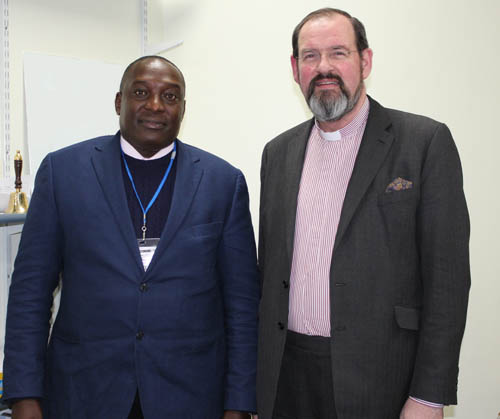On 11th January, Bloxham School was delighted to welcome Paul Mbugua, Headmaster of the Woodard Schools-aided Woodard Langalanga Secondary School in Kenya.
On Monday, Bloxham School was delighted to welcome Paul Mbugua, Headmaster of the Woodard schools-aided Woodard Langalanga Secondary School in Kenya.’
Paul Mbugua visited Bloxham as part of his trip to the UK – visiting a number of Woodard schools and attending the January Woodard Schools Heads’ Conference. Prior to visiting Bloxham, Mr Mbugua had already enjoyed tours of Ardingly College and Lancing College, other members of the Woodard Schools corporation. During his visit, Mr Mbugua led a fascinating assembly for Bloxham staff and students, describing what school life was like for children back in Kenya, and explaining how his school has grown and evolved since its launch back in 2012. As well as leading the assembly, Mr Mbugua met staff members and school Prefects and also taught a couple of classes. He was delighted by the enthusiasm of the students to participate during lessons and was impressed by what he saw as the Bloxham education teaching its students to become “leaders of the future”.
Mr Mbugua’s visit to the UK follows Bloxham’s Gerard Moate’s own trip to Kenya during the October half term, during which he spent some time at the school in Langalanga and learned a lot about the school and got to know its staff and students.
Mr Mbugua has been a Headteacher at the Woodard Langalanga Secondary School in Kenya for the past three years, as well as being an English teacher. The school was founded by the Kariandusi School Trust and it took two years and the support of schools across the Woodard corporation to raise the ‘250,000 required to build and equip the school. The school was finally opened back in January 2012.’Despite being a school of over 400 students, the government is only able to provide enough money to support six teachers, whilst the other six teachers are paid for by the parents. Mr Mbugua explained that often the parents of his students have to go without food in order to be able to send their children to school and, as such, the school guarantees to provide the child with a main meal during the school day. Shockingly, only 50% of children in Kenya are able to go on to a secondary education (which begins at age 14), and only 10% of that number go on to receive a degree from university. All Kenyan children who do attend school are obliged to study three languages, the national language, their mother tongue and English.’Education is seen as the make-or-break of a family in Kenya because, if a child is able to receive a good education, they can go on to a strong career and be able to support the rest of their family. Such is the pressure on these children to achieve good grades that armed guards are present during national examinations, ensuring that bribery and corruption doesn’t exist. As some Woodard schools have already done, In the future, it is hoped that more will sponsor a number of scholarships, enabling some children to attend school who wouldn’t otherwise be able to do so.
To learn more about the Woodard Langalanga Secondary School and the Kariandusi School Trust, visit their website here.


